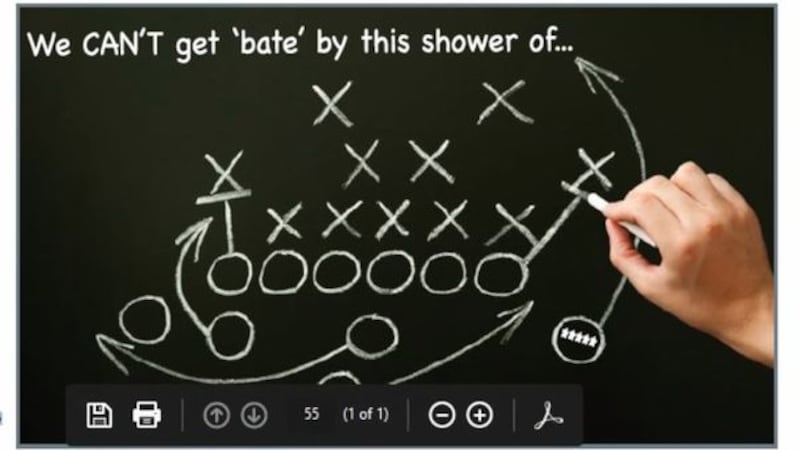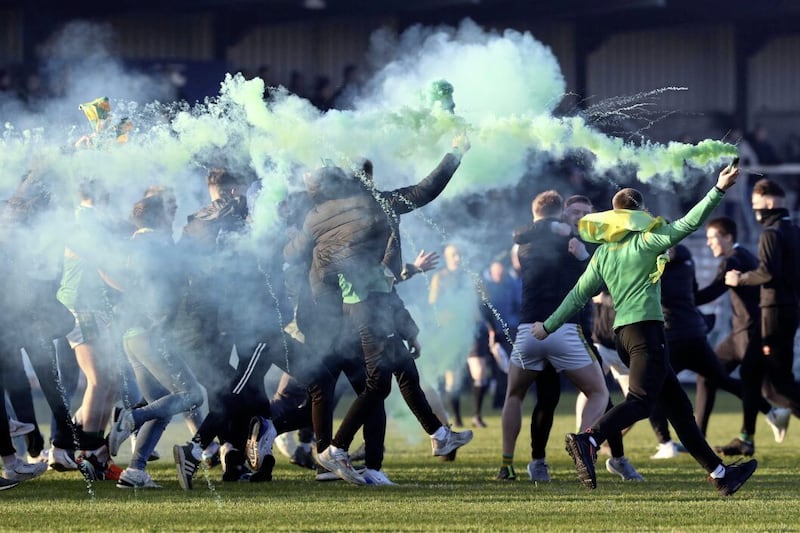One of the men name-checked in Mickey Harte’s book, ‘Kicking Down Heaven’s Door’ transformed the way I think about coaching.
That man was Bart McEnroe
I once attended a coaching seminar that was given by Bart. I was lucky to be there because after Tyrone won the All-Ireland, Bart wasn’t cheap!
The main lesson I took from the night was that nearly everything said in GAA changing rooms is 100 per cent nonsense.
Or, as we say in the GAA, ‘110 per cent’ nonsense.
Bart talked about ‘abstract’ instructions and ‘concrete’ instructions.
Abstract instructions mean everything and they mean nothing.
With concrete instructions, a good manager will deliberately create his own coaching vocabulary.
He will develop and reinforce a series of coaching cues. Each cue will have a very specific meaning.
By repeatedly drilling the meaning of these cues into his players, the coach can then communicate very effectively.
After Bart explained all this, I realised that concrete coaching didn’t actually exist in the GAA.
I’m still not entirely convinced that the language in changing rooms has changed that much over the years, but for the sake of nostalgia, I thought it would be interesting to revisit the old days.
What follows is every managerial team talk ever given in the GAA for about 100 years.
Goalkeeper
“If the short one is on – give it.''
That was it.
Defenders
The GAA’s coaching manual for all corner backs included the following commands: “let him know you’re there,” and “get inside his jersey”.
Of course, managers don’t quote manuals.
So, every corner-back in God’s creation was told to “get up your man’s ass” or “arse,” depending on linguistic preferences.
Aye. Okay gaffer. Leave that one with me.
Midfielders
The advice for midfielders was always nice and simple yet loaded with enough psychological pressure to cripple the average sportsman.
“Listen lads, if we win midfield, we’ll win the game.”
Aye. So, it’s just the two of us who have to go out and win the game. Cheers boss. No pressure then.
Forwards
The forward line is where things could get very technical.
Forwards were told to “get out in front of your man”.
However, forwards being forwards, they always got some garnish.
Assisting them with the tactical problems posed by their roles, forwards would also be advised to “make yourself available” and to “always show for it”.
It was very important to “show for it”.
And in a small nod to the fact that it’s actually a team game, if a forward ran into difficulty, the advice was always: “get in there and help him”.
Aye. Help him. With what exactly?
Coaching Tips for the Defence
“Two half fouls don’t make a whole foul.”
What’s the worst thing about this tip? To those who actually understand what it means, it was and remains 110 per cent true.
A different scenario. You win the ball on the goal line. You are immediately swamped by a wave of feral-like forwards who are screaming “don’t foul” as they tear lumps out of you.
What do you do? Simple. You ‘walk out with it’.
Aye. That’s right. Walk. Try that some time.
Coaching Tips for Midfielders
The Inuit people of the Arctic region have more than 100 words for snow.
The English have more than 100 words for rain.
And the GAA has more than 100 ways of telling a midfielder how to kick a ball.
‘Give it in first day’.
‘Send it in’
‘Give it long’
‘Put it on top of him’
‘Let the ball do the work’
‘Part with it.’
‘Give her the laces’
And as Eamon Mulholland from Bellaghy would still say: “Jaysus Christ, would ye kick her on in”.
Of course, there were some deviations from the norm. Okay, there was only one deviation.
That was: “put it into space”.
Aye. Space. Send it to the moon.
Coaching Tips for Forwards
No coaching tips were ever given to forwards.
Physical and Strategic Motivation
Pre the discovery of performance metrics, only two factors ever dictated the outcome of any game of Gaelic football.
Before the match, you said: “the team that wins midfield will win this game”.
From the men talking outside the chapel to the pundit on television, that’s the only thing anyone ever said.
But when the match was over, “the hungrier team” always won.
Given the considerable influence of ‘hunger’ in Gaelic football, it was no surprise that it played a huge part in team talks.
Not only did you have to be hungry, you had to be a lot hungrier than the bunch next door.
You had to be starving. You had to be absolutely famished.
Because you had to “want it more than them”. In fact, you had to be so hungry that you were prepared to “die for it”.
Aye. That’s right. Death. Actual martyrdom. For the club. For a league game in July.
Final thoughts
Before my first game for the Glen seniors, one of our players made the following remark.
He said: “It’s bad enough getting ‘bate’ by anybody, but let’s not get ‘bate’ by this shower of *****”.
Before the second game, he said the same thing. Third game, he said it again. Fourth game – again.
I eventually realised he said the same thing about every team.
Years later, I told this yarn to various friends. It turned out there was a player in their club who issued the same decree.
Little did we realise then that we weren’t just listening to a team-mate who kept churning out the same stock phrase, we were also listening to managers who were saying the exact same thing as well.
“Remember lads, there are 14 battles out there and if every man wins his battle, we’ll win this game.”
Aye. Winning 14 battles. That’s a 110 per cent success rate. What are the chances?
It doesn’t get much more abstract than that.








